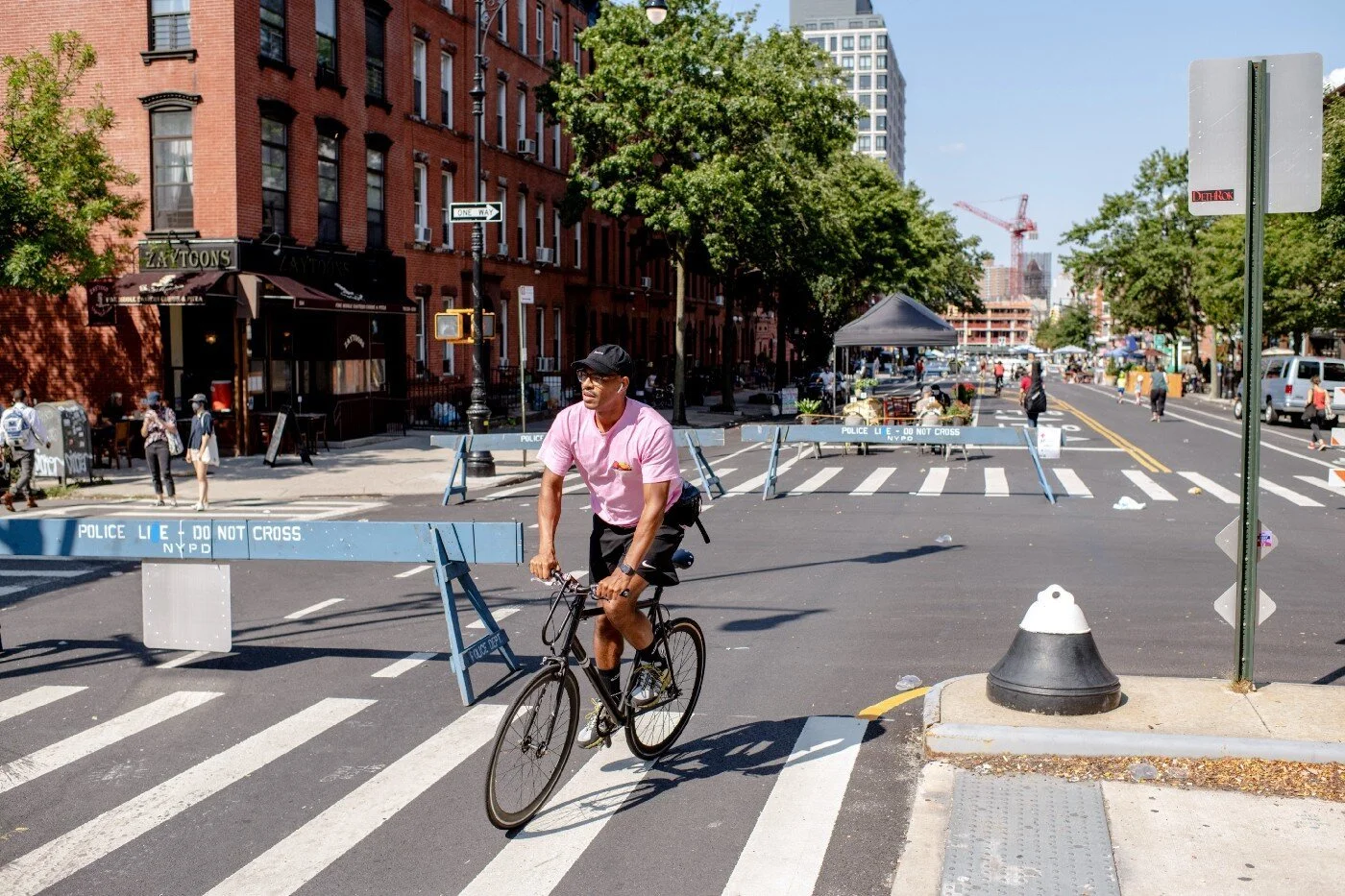Open Letter to Mayor de Blasio from the Open Streets Coalition
Dear Mayor de Blasio,
We’re members of the Open Streets Coalition, including leaders and supporters who for the past ten months have helped maintain and support Open Streets in New York City. We thank you for listening to the millions of New Yorkers yearning to breathe freely in our streets by making the Open Streets program permanent. Today, we’re asking you to ensure that the Open Streets we enjoy and manage be improved and expanded equitably throughout all five boroughs.
As New York City became the epicenter of COVID-19 in the spring of 2020, the need for physical distance, fresh air, and exercise to stay healthy became a pressing need for many of our communities. Open Streets not only allowed us to get outside during the first wave of the pandemic but also enabled our communities to spring back to life in the summer.
Open Streets allowed us to rethink how we use our streets, not just as space for transportation and storage of vehicles, but as space to meet our neighbors and stroll, socialize, dance, and relax safely. Prioritization for motor vehicles in our public space has resulted in thousands of senseless deaths and injuries caused by traffic violence, and respiratory illness caused by carbon pollution. By prioritizing people, our streets can instead serve as playgrounds for children, a reprieve for parents looking for fresh air, and a place for local businesses to attract more customers. In neighborhoods like Jackson Heights, they provided outdoor space in a community that lacks sufficient park space. In neighborhoods such as North Brooklyn, the Lower East Side, and others, residents and restaurants shared space that helped to save our local businesses, as well as spaces for demonstration and protest. Our streets are an essential part of a neighborhood’s way to enjoy life, to cope with the current pandemic, and our streets must be a way to help us bounce back as COVID-19 recedes.
Now more than ever, we need to ensure that these spaces continue to serve communities. While New York City is home to the biggest Open Street program in the nation, there are still neighborhoods that do not have access to this valuable program. Communities such as the South Bronx and the North Shore of Staten Island still lack corridor-wide Open Streets. Even more, some Open Streets that were open in 2020 have since been closed. While some have received confirmation that they will return this spring, the fate of others is uncertain.
Based on our experiences as community partners who support, have operated, or seek to operate Open Streets, we recommend the following to improve and expand the Open Streets program:
After assessment by the New York City Department of Transportation, determine which Open Streets can be shifted to 24/7 full-time operation;
Codify into law the reduction of the speed limit on Open Streets to five miles per hour;
Dedicate resources to volunteer groups that manage open streets, with an emphasis on lower-income communities, as volunteer-led Open Streets are unsustainable and inequitable;
Connect Open Streets into a useful transportation network, bringing residents to retail corridors, transportation hubs, and open park space;
Provide amenities, such as signage, benches, chairs, planters, and improved barriers, to provide for a safer and more inviting experience;
Implement permanent street safety measures and provide more sophisticated barriers to prevent through-traffic on Open Streets;
Limit and optimize commercial vehicle use, such as encouraging freight and for-hire vehicles to make pick-ups and drops on side streets, and creating loading zones to discourage double parking;
Provide daily programming to encourage Open Streets usage by the local community, including exercise classes, educational programming, arts and cultural performances, and more.
Improve traffic calming measures on Open Streets: Restaurants corridors;
Allow businesses in the Open Storefronts program to utilize the roadway on non-Open Streets.
We hope that these suggestions serve you as we continue fighting COVID-19 and building a safer, more liveable city. As the city recovers from the pandemic, Open Streets must be seen as a tool to maintain physical distance, a cornerstone of vibrant communities, and a priority for our city budget, newly infused with funding from President Biden’s American Rescue Plan.
Sincerely,
#OpenStreets Coalition, 63 local groups below
Transportation Alternatives
34th Ave Open Street Coalition
510 West 134th Tenant Association
89th Street Tenants Unidos Association
BetaNYC, a founding member of the North Brooklyn Open Streets Community Coalition
Bike New York
BRAKES
Bronx Health REACH
Bronxmama
Brooklyn Greenway Initiative
CHEKPEDS
Ciclistas Latinoamericanos de New York
Court Square Civic Association
COVID Care Neighbor Network
Eastchester Gardens Resident Association
El Puente
Families for Safe Streets
Financial District Neighborhood Association
Fort Greene Open Streets Coalition
Friends of Cooper Park
Friends of Tremont Park
Greater Flushing Chamber of Commerce
Guardians of Flushing Bay
Hall St. Open Street
Hell’s Kitchen Neighborhood Association
Hollaback!
Hunters Point Parks Conservancy
Jackson Heights Beautification Group
KiDiCAL Mass NYC
Kips Bay Boys & Girls Club
Loisaida Open Streets Community Coalition (LOSCC)
LUNGS (Loisaida United Neighborhood Gardens)
Make Brooklyn Safer
Make Queens Safer
New York League of Conservation Voters
North Brooklyn Mutual Aid
North Brooklyn Neighbors
North Brooklyn Stewards Initiative
Open Plans
Out Cycling Inc.
Out Rockaway
Queens Bike Initiative
Park To Park 103
Park Slope Neighbors
play:groundNYC
Prospect Heights Neighborhood Development Council
Redbeard Bikes
Respect Brooklyn
Riders Alliance
Safe Roads Alliance
St. Ann’s Corner of Harm Reduction
Sixth Street Community Center
South Asian Fund For Education Scholarship and Training INC (SAFEST)
Staten Island Therapeutic Gardens
StreetsPAC
Sunnyside Woodside Open Streets (SWOS)
The Children’s Village
Together We Can Community Resource Center
Urban Health Plan
UP-STAND
WE Bike NYC
West 22nd Street Open Street
West 134th St Block Association

